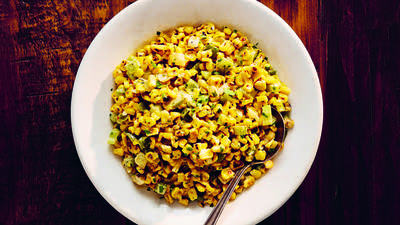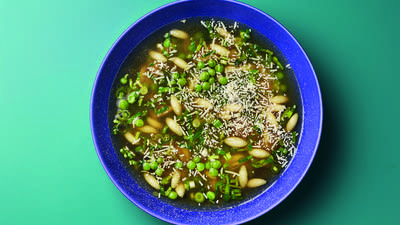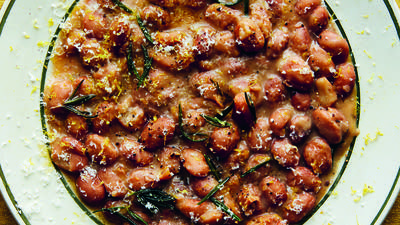
Cookbook author and former chef Amy Thielen says working in restaurant kitchens can be a postive experience, almost like being a member of a supportive large family, or playing a role in theater troupe. But she’s also seen the dark side to many kitchens, one that allows for sexism, physical aggression and verbal conflicts. Thielen recounts her life in kitchens in her book, Give a Girl a Knife. She discusses her experiences – good and bad – with Francis Lam.
Amy Thielen recipes on The Splendid Table:
Francis Lam: There are lots of stories and books about life in restaurant kitchens, but most of them are about the blood and guts; they're about the life on the edge. However, there is a passage in your book that I want to talk about because I think it's about a side of that life that we don't hear much about. There's this moment where you describe two of your fellow cooks. You're working in restaurants in New York City at the time -- high-end, super high-level restaurants. You and these other cooks are prepping. They start talking about their girlfriends. One of them starts talking about how he came home in the middle of the night from work, and she made him a sandwich. Recalling that seemed to make both of them want to cry. It's such a tender moment. It made me feel like people really can find family in restaurant kitchens. Can you tell me what you found in your kitchen families.
Amy Thielen: Definitely. There was a kinship. That moment is really about feeding others. It’s about these two guys, who spend their entire day like all of us spend all of our days, being generous and feeding others. With the hospitality industry there is this compulsion to feed and to give. And then when they go home somebody does that for them. This is powerful.
I definitely bonded with many of the people that I worked with over the years. That's what a kitchen is; it becomes very familial because you spend so much time together. At the same time, it's a very informal atmosphere. You put those two ingredients together and you have an intense environment, there are high stakes, and you have to depend upon one another. There is a family feeling.
 Amy Thielen with Wild Ducks with Birch Syrup Teriyaki
Photo: Matt Taylor-Gross
Amy Thielen with Wild Ducks with Birch Syrup Teriyaki
Photo: Matt Taylor-Gross
FL: You left restaurant cooking years ago.
AT: It's been a long time. I'm not a representative any longer of a woman chef or anything like that. I cooked for 10 years or more, but it's been about 10 years since I was there.
FL: The famous stories about restaurant kitchens are about that intensity that you talk about. There are lots of ways to look at that camaraderie. It's almost like when you play sports where you become a team. You steel yourselves with the help of your teammates.
AT: Sports is a good analogy, but I think theater is a better one. Because when you're working in a kitchen nobody else can play your part. Nobody else knows your lines. That's exactly why when cooks get sick they don't call in sick, because nobody knows your part.
FL: But there is this other side, right? You described it just now as an informal situation. And it's also a situation where there is a lot of hyper-macho intensity, there's a lot of transgressiveness. In some cases, it's like being transgressive for its own sake. A lot of is about, "We are a pirate ship, so we're going to act like one and be foul mouthed!” It is becoming clear, in what we've been hearing in the media and reports about assault and sexual harassment in the industry, there is a lot of sexism. And there's a lot of conversation about how that kind of environment feels fine for some people but makes other people feel threatened and unsafe. In some cases, they are literally threatened and unsafe. As more of these stories come out, it's become clear to me as a man who hasn't had to deal with this stuff on a personal basis that people -- especially women -- either end up just putting up with it, thinking it's part of the job, or it finally drives them out. And you have this line – and it's a beautiful line – but I want to ask what it means. You say you saw a lot of things that gave you pause, but you didn't want to hit the pause button when you were there. Why not?
AT: There's so much to respond in what you just said. I wanted to be a cook. I liked the environment of cooking because it was informal and it wasn't an office. But yes, the sexism was rampant and upsetting. I don't think there was a woman who ever worked in a kitchen who wasn't upset by it. Every woman took a different approach and tact to dealing with it. Some women would talk dirtier than the guys, and eventually that was kind of what I did.
I experienced plenty of sexual harassment, but I was never assaulted. It was never physical. It never got to the point for me that I had to consider taking legal action. When I hear these stories, I feel a little bit of survivor's guilt. It's like, "Wow, it wasn't that bad for me." And why wasn't it? I don't know. But I just want to say a shout-out to everybody who didn't have it as easy as I did.
With that said, there was plenty I had to deal with, and that women have to deal with, in kitchens. It's like you have an extra part-time job on top of your intense and difficult job; that's dealing with the emotional fallout of being a woman and having to be a little resistance fighter to get what you want. The kitchen can be such a competitive environment, and there's almost a toxic masculinity a lot of times in kitchens. Frankly, I don't think that's good for the guys either. I think that a lot of men sense that and know that's not really what they want either.
 Give a Girl a Knife
by Amy Thielen
Give a Girl a Knife
by Amy Thielen
FL: Tell me more about that. Why, in your mind, is it not good for the guys either?
AT: Look at the brigade system as started by Georges Auguste Escoffier back in France – we have to go back all the way to this to explain it. The system of learning how to be a cook in Europe was always apprenticeship. At some point, from what I've read, those apprenticeships were on-site and the sleeping arrangements were communal. So, it was just like "no women allowed." At that point going forward it was this very male environment. The apprenticeships started very young, like 13 or 14 years old. So, you've got this delayed adolescence at play in addition to an extremely high-volume, high-energy job with intense, exhausting long hours. You've got that competitiveness and an eighth-grade sensibility and you're bringing those two things together.
I like banter. I like jokes. I even like bawdiness; a lot of women who are in the kitchen do. There's nothing wrong with it. It's just that when it crosses the line into a power dynamic that's sexual, or when somebody says something that makes me have to think about their "lonely parts," that's completely out of line. I don't care what industry you're in.
FL: This is a dumb analogy, but it's almost like there's a weird dynamic in restaurant kitchens and in the chef world where you have to feel like you're a warrior, and in some ways you have to feel like you're a poet.
AT: Yes.
FL: And the violent culture makes it alternately like people are dehumanizing themselves, and then that's why it's also easy to dehumanize other people that you work with and treat them terribly.
AT: And that kind of talk demeans the industry all around. You know what it is exactly like? I have chickens now. I look out the window and I see it happening; my roosters are performing, it's bravado, they're crowing.
But with that said, I was given a lot of opportunity by a lot of the chefs that I worked for. I was able to rise up quickly and I was given a lot. I also have to say that a lot of women do extremely well in cooking; the qualities that are needed to make a chef a great cook are not gendered whatsoever. Things like levelheadedness, unflappability, good communication skills, a good palate, hard work, and sensitivity. All of these things are just not gendered. There's absolutely no reason that men have had a run on the industry for as long as they have.
FL: Thank you so much for talking with us, Amy.
AT: I'm happy to.
Before you go...
Each week, The Splendid Table brings you stories that expand your world view, inspire you to try something new, and show how food connects us all. We rely on your generous support. For as little as $5 a month, you can have a lasting impact on The Splendid Table. And, when you donate, you’ll join a community of like-minded individuals who love good food, good conversation, and kitchen companionship. Show your love for The Splendid Table with a gift today.
Thank you for your support.
Donate today for as little as $5.00 a month. Your gift only takes a few minutes and has a lasting impact on The Splendid Table and you'll be welcomed into The Splendid Table Co-op.




